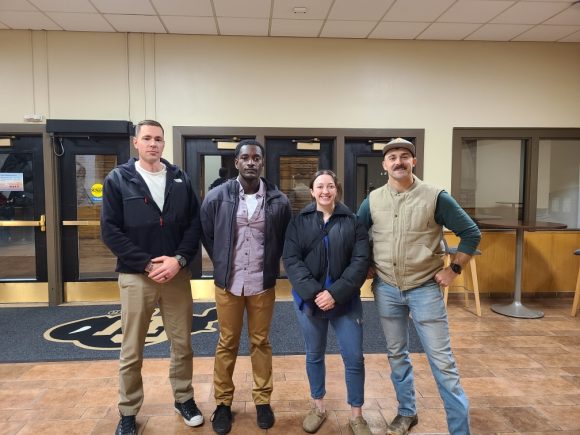
Students and members of the U.S. military pose outside of the University of Colorado Boulder Student Government legislative council meeting on March 23, 2023. (Isabella Hammond/CU Independent)
A number of University of Colorado Boulder students spoke against a bid to ban concealed carry on campus at the student government legislative meeting on March 23.
Naval Reserve Officers Training Corps (NROTC), Marine Corps Enlisted Commissioning Education Program (MECEP) and veteran students spoke at a public open hearing on Thursday night to urge CU Boulder Student Government (CUSG) and the Board of Regents to reconsider the call for a ban on concealed carry. �
CUSG passed a resolution asking the Board of Regents to reverse the policy back in October, most recently speaking at the regent’s meeting in February.
�We are not the ones shooting our fellow law-abiding citizens. We have our concealed carry permits in order to ensure the safety of us and those around us,� said Connor Borshard, who enlisted in the Marine Corps in 2010 and is a junior in mechanical engineering.
A total of five students spoke at the lectern, limited to three minutes per person. One of their concerns was a survey that CUSG administered at the University Memorial Center and over social media. The survey asked students how they felt about concealed carry on campus, but the five who spoke at Thursday’s meeting said this survey didn’t effectively gauge student opinions on the subject.
According to survey result data from Internal Tri-Executive Rachel Hill, 110 CU Boulder community members responded to the survey, mostly students in the College of Arts and Sciences. A vast majority of respondents said they did not have a concealed carry permit and did not believe it should be allowed on campus.
�Our decision to support a ban on concealed carry was not based on this survey data alone,� wrote Hill in a statement to the CU Independent.�
�It�s great they made their voices heard, but I don�t foresee that those people represent the majority of students� opinions,� she said later in an interview.
Hill said she would be interested in repeating the survey, including an additional question measuring whether respondents understood concealed carry permit requirements. However, she also said repeating the survey was unlikely, citing a lack of time and logistical difficulties with increasing the sample size.
The group who spoke against Hill�s resolution first heard about it during an NROTC active shooter training on March 15. Justice Appiah, a political science and international affairs junior and MECEP member, emailed Hill the next day and organized the group to speak at the legislative council meeting on March 23.
Appiah suggested alternative compromises like increased police patrols and active shooter drills, saying that a ban on concealed carry would be unfair to those with permits.
�I don’t want to see anybody get hurt,� Appiah said. �The policy that they’re proposing has nothing to do with increasing security on campus.�
Lorissa Barnes, an international affairs senior and an active duty Navy sailor, added, �I concealed carry because I don’t always feel protected by the police. I think that sometimes women and minorities and plenty of other groups don’t feel fully protected by the police.�
For now, the student group and Hill have said they plan to attend the next University Affairs Committee board meeting on April 18 to make their case to the regents.
�The fact that legislative council who are the elected representatives [of] the student body all voted unanimously to pass this should say something,� Hill said.
Contact CU Independent News Editor Isabella Hammond at isabella.hammond@colorado.edu.
